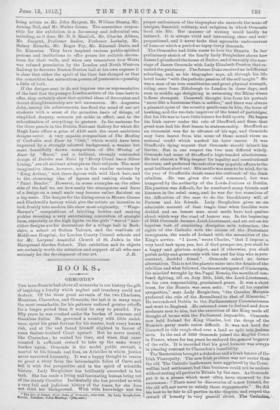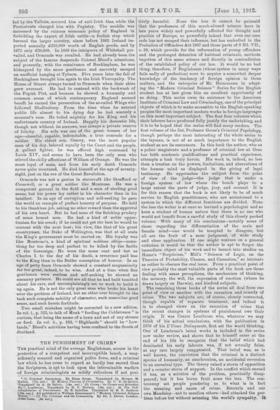BOOKS.
ORMONDE.* THE later Stuarts had above all monarchs in our history the gif t of inspiring a loyalty which neglect and treachery could not destroy. Of the three great servants of the two Charleses, Montrose, Clarendon, and Ormonde, the last is in many ways the most remarkable, for his patience endured greater rebuffs for a longer period than it would be easy to parallel. For fifty years he was crushed under the burden of immense and thankless duties. He governed a country with little assist- ance, spent his great fortune for his master, took every known risk, and at the end found himself slighted in favour of some feather-brained Court upstart. But he never soured, like Clarendon ; he waited his time, and when that came counted it sufficient reward to take up the same weary burden again. Ormonde is the model public servant, a marvel to his friends and foes, an Aristides in whom justice never narrowed humanity. It was a happy thought to rescue so great a story from the interminable folios of Carte and tell it with due perspective and in the spirit of scientific history. Lady Burghclere has brilliantly succeeded in her task. She has made a living and fascinating human being out of the stately Cavalier. Ineidentally she has provided us with a very full and judicious history of the times, for she does not stint her background. With wide knowledge and the • Tha Lijd of Jamaa, lialco of Ormonde, 1810-109$. By Lady Burglialore. aorols. Loudon:. John itturray. ,t2ALmaitrd . .
proper enthusiasm of the biographer she unravels the nnaze.of intrigue, financial, military, and religious, in which Ormonde lived -his life. Her manner of writing could hardly be bettered. It is always vivid and interesting, clear and well- proportioned, and it never lacks that agreeable undercurrent of humour which-a periodso topsy-turvy demands.
The Ormondes had little cause to love the Stuarts. In her preliminary sketch of the family Lady Burgholere shows how James I. plundered thehouse of Butler, and it was only the mar.. riage of James Ormonde with Lady Elizabeth Preston that re- united the patrimony. The future Duke received an indifferent schooling, and, as his biographer says, all through his life. loved books "with the pathetic-passion of the self-taught." He- wes •a man of an iron constitution and great physical strength, riding once from Edinburgh to London in three days, and even in middle age :delighting in swimming the Rhine-where- it flows strongest. Cromwell thought '-him from his portrait "more like a. huntsmanthan .a soldier," and there was alwaye• a pleasant-spice of the country gentleman in him, the lover of hawking, and the resolute improver of the breed of partridges. But his life was to have little leisure for fieldsports. He began his Irish career under the rule of .Strafford, and from that great man had his first lesson in statesmanship. Strafford as an economist was far in advance of his age, and Ormonde may have learnt from him some of those sound views oil national credit which marked his later career. It was. Strafford's dying request that Ormonde should inherit his. Garter. But in one respect the two men differed widely. Ormonde had none of Strafford's high-banded absoluteness. He had almost a Whig respect for legality and constitutional decorum; and preferred the safe slew way in publicaffairs to t he- most brilliant short cut. His -mettle-was soon to be tried, for hi the year of Strafford's • death came the outbreak of the Irish, rebellion. He was given the chief, command, but woo hampered by the-authority of the Lords Justices at Dublin,. His position was difficult, for he numbered many friends -and kinsmen in the rebel camp, and he was .far too conscious of the difficulties of the ease to -do the bloodthirsty wilt of Parsons and his friends. Lady 'Burghelere gives us am admirable account of that tragic time -when families were divided and an honest man must needs have had qualms about which way the road of honour ran. In the beginning. of 1644 Ormonde became Lord-Lientenant, and set out on hits hopeless task of .combining discipline with toleration, the rights of the Catholic with the claims of the Protestant of the King's .the needs of Ireland with the necessities King's service. " I know," wrote Charles, ".that I ienelp ose : very hard task upon you, but if God prosper me, you shall be, a happy -and glorious subject,. and if otherwise, you shall perish nobly ancLgenerouslywith him and for him who is your constant, faithful friend," .Ormonde asked no better alternatives. This is not theplace to enter into the details-of the rebellion and what followed, the insaneintrigues of Glamorgan, the mischief wrought by the Papal Nuncio, the months of con- fused fighting, till on July 29th, 1646, the .Lord-Lieutsnant„ on his own responsibility, proclaimed ,pease. It was a short truce, for the Nunoio was soon astir. ".For all his royalist sympathies," says Lady Burghclere, " the Cavalier Marquis. preferred the rule of the :Roundhead to that of Rinuccini." He surrendered Dublin to the Parliamentary Commissioners. and-went to England. He returned soon to Ireland and drew moderate men to him, but the execution of the King made all thought of. terms with the Parliament impossible. Ormonde now held Ireland for Kiug Charles, but the dregs of the- Nuncio's party made -union difficult. It WA2 not hard for Cromwell to ride rough-shod over a land so split into jealous. sects. In the end of 1G60 Ormonde joined the .English Court in France, where for ten years he endured. the genteel beggary of the exile. 'It is recorded that his good humour was alweya in pleasing-contrast to Clarendon's The'Restoration brought a dukedom and a fresh tenure of the Irish Viceroyalty. The new Irish problem was not easier than the old. The Catholic landownersi were aggrieved by the Crow=7 wellittn land settlement,-but that business could not be undone• without setting all parties in Britain by the ears. Aa 0 rthonde put it in a phrase which mutt often have -occurred -'to his successors "There must be discoveries of a new Ireland, for the old will not serve to -satisfy these engagements." He did his best to' be fair to all parties. intheelispute, and reaped the, reward of honesty in 'Very general' abuse. -The Oathollea.
led by the Tunas, accused him of anti-Irish bias, while the Protestants charged him with Papistry. The muddle was increased by the ruinous economic policy of England in forbidding the export of Irish cattle—a foolish step which harmed the larger country, since before 1663 Ireland im- ported annually £210,000 worth of English goods, and by 167'2 only 220,000. In 1669 the intriguers of Whitehall pre- vailed, and Ormonde was recalled. He bad already been the subject of the famous desperado Colonel Blood's attentions, and presently, with the connivance of Buckingham, he was kidnapped by the same gentleman and narrowly escaped an unofficial hanging at Tyburn. Five years later the fall of Buckingham brought him again to the Irish Viceroyalty. The House of Stuart always turned to Ormonde when their skies grew overcast. He had to contend with the backwash of the Popish Plot, and because he showed a humanity and common sense of which contemporary England seemed bereft he earned the persecution of the so-called Whigs who followed Shaftesbury. From the time when he entered public life almost to his dying day he had scarcely a moment's ease. He toiled mightily for his King and his unfortunate country of Ireland. Happily his domestic life, though not without its sorrows, was always a private reserve of felicity. His wife was one of the great women of her age—cheerful, capable, indomitable, a true comrade for a soldier. His eldest son, Ossory, was the most popular man of his day, beloved equally by the Court and the people, A. gallant fighter, lie was offered high command by Louis XIV., and seems to have been the only man who etirred the chilly affections of William of Orange. He was the most loyal of sons, and from his early death Ormonde never quite recovered. He died himself at the age of seventy- eight, just on the eve of the Great Revolution.
Ormonde was not a genius in statecraft like Strafford or Cromwell, or a great soldier like Montrose. He was a competent general in the field and a man of sterling good sense, but his power lay rather in his character than in his intellect. In an age of corruption and self-seeking he gave the world an example of perfect honesty of purpose. He held to his thankless job, asking no other reward than the approval of his own heart. But he had none of the finicking prudery of some honest men. He had a kind of noble oppor- rtunism for his creed ; if he could not get the best be would be content with the next best ; his view, like that of his great countryman, the Duke of Wellington, was that at all costs the King's government must be carried on. His loyalty was like Montrose's, a kind of spiritual noblesse oblige—some- thing far too deep and perfect to be killed by the faults of the Sovereign. He wore the same coat and bat as Charles I. to the day of his death, a reverence paid less to the King than to the Butler conception of honour. In an age of petty fears Ormonde showed a constant magnanimity far too great, indeed, to be wise. And at a time when fine gentlemen were restless and self-seeking he showed an .uncanny patience. He could see all that he had built tumbled about his ears, and uncomplainingly set to work to build it up again. He is not the only great man who broke his heart over the problem of Ireland, but no other ever brought to the task such complete nobility of character, such masculine good sense, and such heroic fortitude.
Two small mistakes might be corrected in a new edition. In vol. i., p. 523, to talk of Monk " fording the Coldstream " is curious, that being the name of a town and not of any stream or ford. In vol: ii., p. 183, " Highlands " should be " Low- -lands," Blood's activities having been confined to the South of .Scotland.











































 Previous page
Previous page